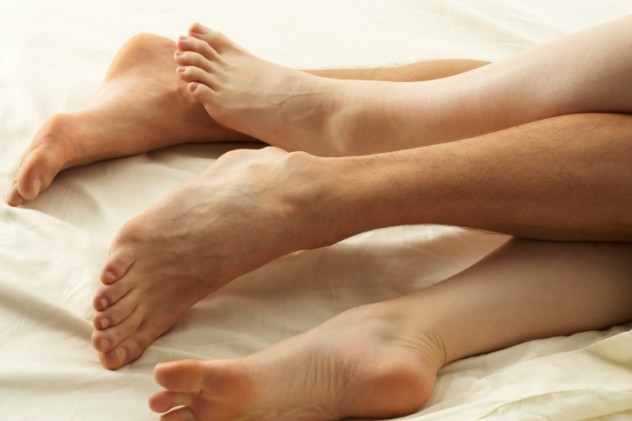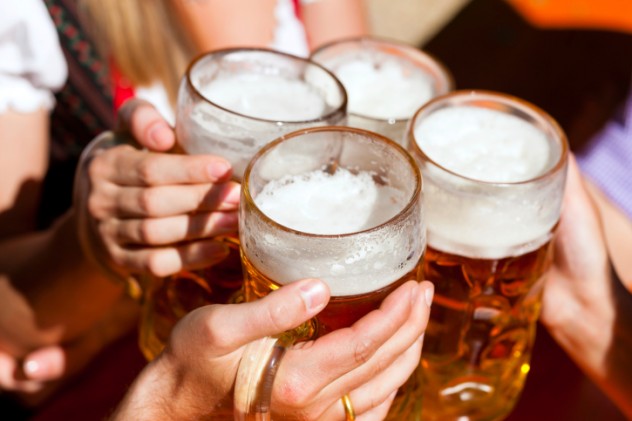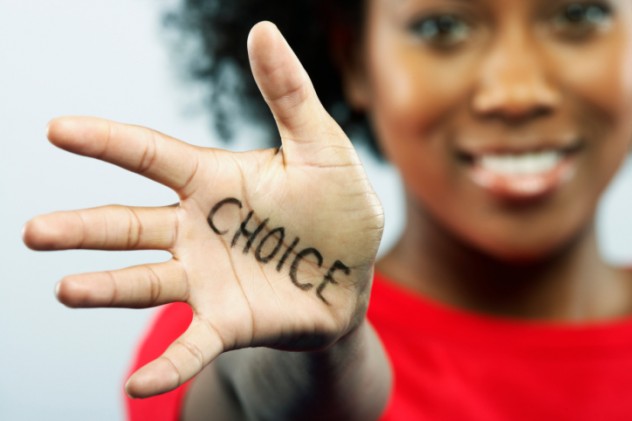 Politics
Politics  Politics
Politics  Humans
Humans The 20th Century’s 10 Most Famous Centenarians
 History
History 10 Influencers Who Lived Centuries before Social Media
 Miscellaneous
Miscellaneous 10 Ancient Etiquette Rules You Never Knew Existed
 Our World
Our World Planet Earth’s 10 Most Hardcore Natural Creations
 Movies and TV
Movies and TV 10 Times Twin Movies Competed with Each Other
 The Arts
The Arts 10 Masterpieces Plucked from the Artist’s Subconscious
 Crime
Crime 10 Fascinating Facts about Rikers Island
 Pop Culture
Pop Culture 10 Things You Might Not Know about Dracula
 Weird Stuff
Weird Stuff 10 Everyday Activities That Were Once Considered Illegal
 Politics
Politics 10 U.S. Presidents Who Cheated on Their Wives
 Humans
Humans The 20th Century’s 10 Most Famous Centenarians
 History
History 10 Influencers Who Lived Centuries before Social Media
Who's Behind Listverse?

Jamie Frater
Head Editor
Jamie founded Listverse due to an insatiable desire to share fascinating, obscure, and bizarre facts. He has been a guest speaker on numerous national radio and television stations and is a five time published author.
More About Us Miscellaneous
Miscellaneous 10 Ancient Etiquette Rules You Never Knew Existed
 Our World
Our World Planet Earth’s 10 Most Hardcore Natural Creations
 Movies and TV
Movies and TV 10 Times Twin Movies Competed with Each Other
 The Arts
The Arts 10 Masterpieces Plucked from the Artist’s Subconscious
 Crime
Crime 10 Fascinating Facts about Rikers Island
 Pop Culture
Pop Culture 10 Things You Might Not Know about Dracula
 Weird Stuff
Weird Stuff 10 Everyday Activities That Were Once Considered Illegal
10 Bizarre Ways You’re Making Yourself Miserable
Religion, retail therapy, a meat-free diet—the Internet is full of people trying to shill “cures” for depression with all the grace of a salesman hawking his last bottle of snake oil. Google “ways to be happy” and you’ll find a million lists reassuring you that all it takes to reach nirvana is a cup of green tea and plenty of fish. Aside from the fact that depression is far too complex to be treated with something as dumb as, say, getting a new pet, most of these so-called cures aren’t even cures at all. In fact, there’s a very real chance that they’re making things worse.
10 Having Lots Of Sex

Having a great sex life is supposed to be the high score bonus on the game of life. Not only are you obviously charming, attractive, and witty enough to be bedding a string of supermodels, you’re also having lots of really good sex. So let’s say you looked at the psychological makeup of a modern Casanova, what would you expect to find?
How about a seething mass of anxiety and depression? A recent study surveyed 3,900 college students about their mental well-being as well as their tendency to leap into bed with strangers. They found elevated levels of anxiety, social anxiety, and depression among those who frequently engaged in casual sex.
Before you all write in complaining we’ve ruined yet another pastime for you, we should point out that this is a bit of a “chicken and egg” scenario—the researchers didn’t determine whether sex caused depression or depression triggered a desire to lose yourself in sex. Whichever way around it is, it means there’s a very real possibility that Hugh Hefner is the most miserable man on Earth.
9 Being Filthy Rich

Right after “an incredible sex life,” the second thing most of us would probably wish for if we ever met a genie is to be absolutely, stinking rich. After all, money may not be able to buy happiness, but it sure makes misery a lot more comfortable, right?
Sorry, wrong again. We’ve all heard the horror stories about the lottery winners who wound up utterly miserable, but current research suggests even those who start out rich are prone to mental illness. Specifically, children of parents earning over $159,000 a year have been found dangerously prone to anxiety, depression, self-harm, and drug abuse. Only kids from the very poorest families were found to be more at risk than these real-life Richie Rich’s, so what’s going on?
It comes down to the sort of people who are likely to wind up earning over $150,000 a year—highly motivated, ruthlessly driven types with little time for failure in others. In other words, the exact sort of people who are likely to gift to their children a great big bag of neuroses from their first Little League game onward. All this pressure to do well and become a major stockbroker like Daddy manifests itself in a crippling fear of failure.
8 Being Vegetarian

While it may not quite rank up there with winning the lottery or being chased by crowds of screaming groupies, a vegetarian diet is thought of as shorthand for “wholesome and healthy.” By circumnavigating the excess fat and cancer-giving properties of meat, vegetarians seem to be in an ideal position to live long, happy lives making tie-dye shirts and voting Democrat and whatnot—except science suggests otherwise.
A recent German study analyzed the diets and mental health of 4,000 participants using people from all walks of life. The results were surprising, to say the least. Vegetarians were more likely to suffer from anxiety, hypochondria, depression, and even stuff like body dysmorphia than their meat-eating counterparts.
This wasn’t just a mild statistical anomaly, either—the study participants were twice as likely to be mentally ill as the general population, and three times more likely than the study control group. Again, no one’s sure if vegetarianism causes all this misery, or if miserable people are just more likely to ditch the meat, but if you’ve ever needed a scientifically-backed excuse to justify your five-steak-a-day habit, this is it.
7 Not Getting Drunk

Alcohol and depression go together like Glenn Beck and populist extremism. Aside from being a depressant, our favorite liquid drug is also highly addictive, incredibly damaging to the body, and more socially damaging than even crack or heroin. It makes sense to assume, then, that teetotalers will be free from the fog of guilt and misery that binge-drinkers are forced to wade through every Saturday morning. Well, prepare to be shocked.
A Norwegian study recently compared the mental health and drinking habits of an astonishing 38,000 people. Although the research team found that heavy drinking corresponded to high levels of anxiety, the opposite was true of depression. The respondents who exercised rigorous self-control were apparently less happy than those who woke up each morning in a pool of vomit.
The theory goes that those who never drink but live in “drinking cultures” are less likely to forge strong social bonds with people than those who are happy to relax a little with a beer. While we’d never recommend that anyone do a Nic Cage in Leaving Las Vegas, it does seem that total abstinence is a recipe for disaster.
6 Being Religious

We’re used to thinking of religion as a great comfort. After all, when little Timmy’s dog dies, is he gonna feel better hearing that he’s now in doggy heaven, or that he’s a cold and lifeless husk you’ll probably throw out with the trash? For all atheists like to find fault with all aspects of it, surely religion at least has a net effect on happiness.
It’s a nice thought, but that’s sadly all it is. A study published earlier this year followed 8,000 people from different religions, countries, and socioeconomic backgrounds for over six months and charted their vulnerability to depression. It found that the more strongly religious someone was, the more likely they were to experience major depression. At the same time, those whose beliefs changed during the course of the study were also assessed. The ones who dumped their religion to become atheists generally got happier, the ones who dumped their atheism to become religious generally got sadder. On almost every criteria, the devout were shown as being worse off than those who were either secular or “weakly” religious. In short, it seems that any faith claiming to be a path to happiness is unfortunately mistaken.
5 Playing Sports

Exercise is supposed to have a positive effect on the brain, and team sports are surely good for at least making friends and feeling part of a group. So what’s all this nonsense about sport causing depression?
Specifically, researchers looked into the mental health of current and former college athletes and found that those still “in the game” were up to twice as likely to be depressed as those who had graduated. In their hypothesis, the researchers stated that they expected to find former stars—now deprived of their teammates, coaches, and the thrill of the game—struggling with major depression. But their findings suggested the complete opposite.
Like the rich kids one above, it more than likely comes down to the insane pressure college athletes are under. Aside from having to deal with studying, they’ve also got to play their best, not let their team down, and try to reach the very top—all goals that can cause major stress if missed. In spite of what common sense may tell you, sport is no more a guaranteed key to happiness than, say—buying a new pair of Levi’s.
4 Going Shopping

You’ve probably heard of “retail therapy,” the idea that the best way to unwind from a stressful week is to go and splurge your paycheck on a really expensive pair of shoes. It’s a staple of consumerism, the driving force behind stuff like Christmas and 80 percent of all Sex and the City storylines—and according to science, it’s making you totally miserable.
A recent study in the Netherlands followed 2,500 people over six years to gauge their shopping habits and happiness. They found that materialistic people were more likely to be lonely, because shopping creates a “loop of loneliness” that makes them more depressed the more they do it.
The problem comes down to our culture of consumerism. Thanks to decades of advertising, we’re taught to associate certain values with certain products. When we’re unable to afford one of these items or have to spend more than we should to get it, we wind up feeling anxious, isolated from our peers, and miserable. It turns out that retail therapy is less cathartic and more systematically destroying any chance you have at happiness.
3 Listening To Music

It’s not uncommon to hear nostalgic music critics talking about the song or album “that saved their life.” It’s a feeling everyone can understand—that moment when you hear a snatch of song that somehow reminds you that things aren’t quite as crappy as they often seem. Therefore, it can come as a bit of a shock to learn listening to music can apparently make you prone to depression.
In 2011, a University of Pittsburgh study categorized teens by the amount of time they spent listening to music and compared it to their mental well-being. They found that for every increased level of listening, their risk of depression increased by 80 percent. This is almost the exact opposite effect that reading had, with teens becoming 50 percent less likely to be miserable with each level of increased reading time. In fact, music was found to be the pastime most linked with depression, beating out even TV in the sadness stakes.
Why would this be? Are all the teens in Pittsburgh listening to non-stop Radiohead or something? Well, that’s the thing—we don’t know. Perhaps modern music is just too consistently miserable, or perhaps depressed teenagers are simply more likely to try to escape through music. All we can say for sure is that the bouncy guy on the bus with happy hardcore blaring out his earphones is probably more depressed than the girl sat next to him reading the collected works of Franz Kafka.
2 Voting Democrat

According to The New York Times, conservatives are measurably happier than liberals and have been for years. A 2006 Pew study found self-professed conservatives were 68 percent more likely than left-leaning Democrats to say they were “very happy,” with single, childless liberals being the most miserable of all. A similar partisan happiness gap has been consistently reported for decades (LINK 16). In other words, the simple fact that you’d take Ronald Reagan over Bill Clinton means you’re less likely to be depressed.
So what causes all this liberal misery? Well, no one’s really sure. In 2008, Pew suggested it might be because Republicans are more likely to be rich and religious—a statement that flatly contradicts two items in our list so far. Others have claimed conservatives simply have a sunnier outlook, while yet others have noted that liberals are statistically less likely to get married.
However, before you GOP types start celebrating, you should be aware that there’s one type of liberal happier than you are. According to the same studies, people on the extreme left are happier than everyone except the craziest right-wing extremists, meaning that both the Tea Party and Occupy are enjoying life far more most of us in the middle.
1 Being Social On The Internet

Are you the type of person who will finish reading this, scroll down, and leave a comment? We’ve got some bad news—you’re objectively more likely to be lonely and miserable than the guy who just skims and moves on.
A recent study analyzed the Internet usage of a cohort of depressed and non-depressed people and found that unhappy people use the Internet differently from anyone else. Specifically, they were more likely to engage in peer-to-peer usage like sharing photos, music, and opinions through Facebook, chat rooms, and message boards. Healthy people, on the other hand, were less likely to obsessively check their email, spend time on social networks, and sit up late at night reading list-based articles.
This kind of goes against everything we think we know about the Internet. The whole social media interaction thing is supposed to make us less lonely and more connected—hence, everyone seeming to have more Facebook friends than there are people on the planet. However, a huge body of research suggests this view is outdated nonsense. So there you have it: The secret to happiness on the internet is to simply ignore all the angry idiots out there and get on with own thing. Who’d have thought it?








